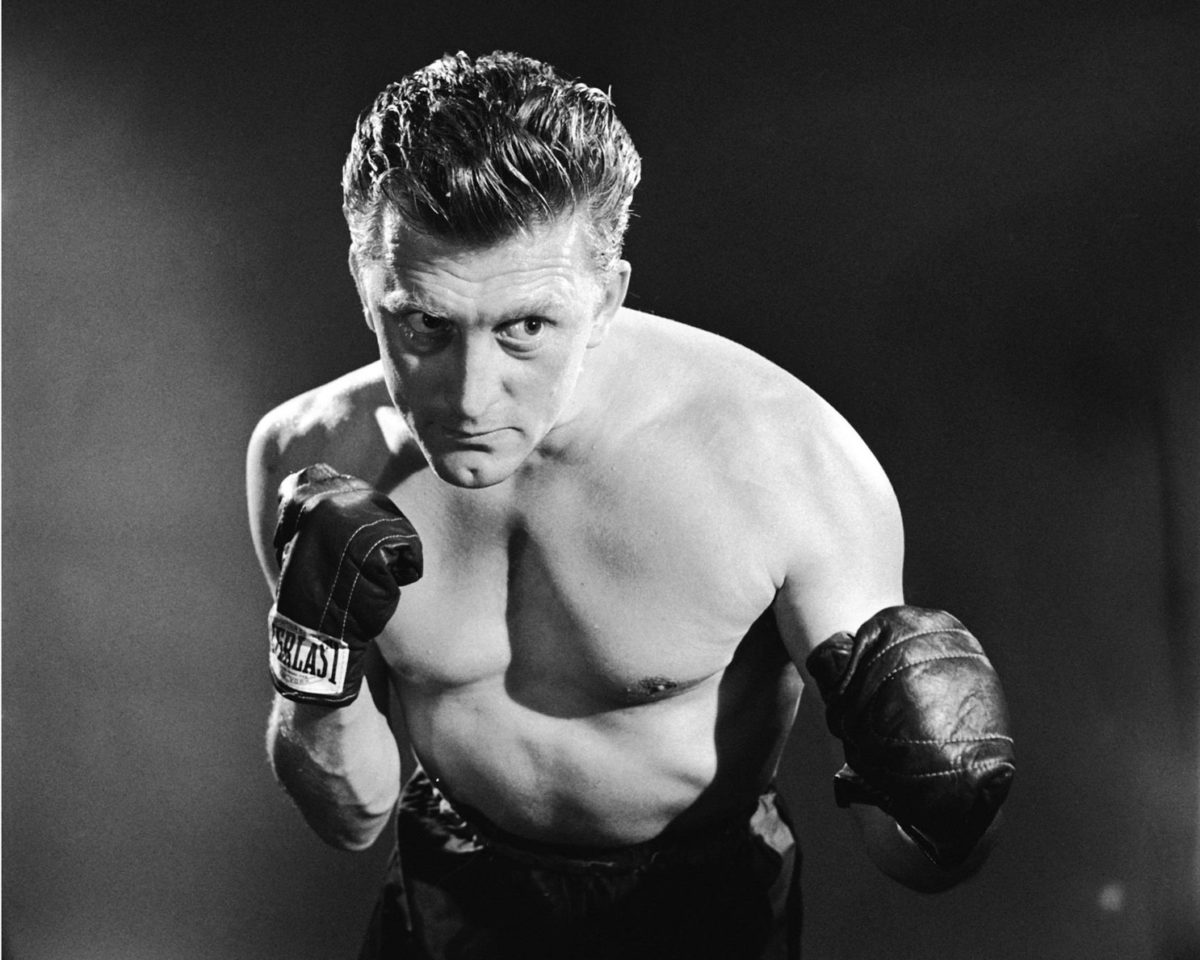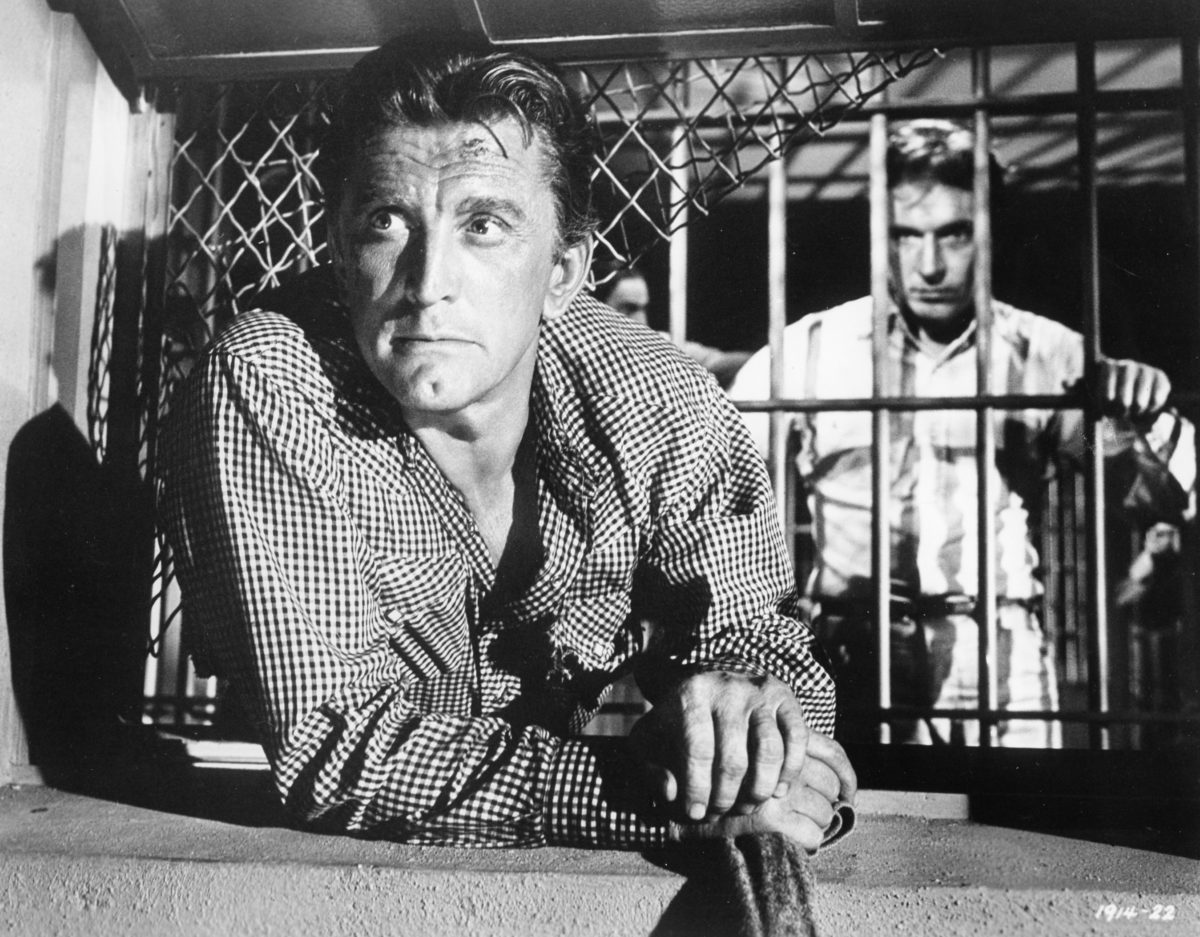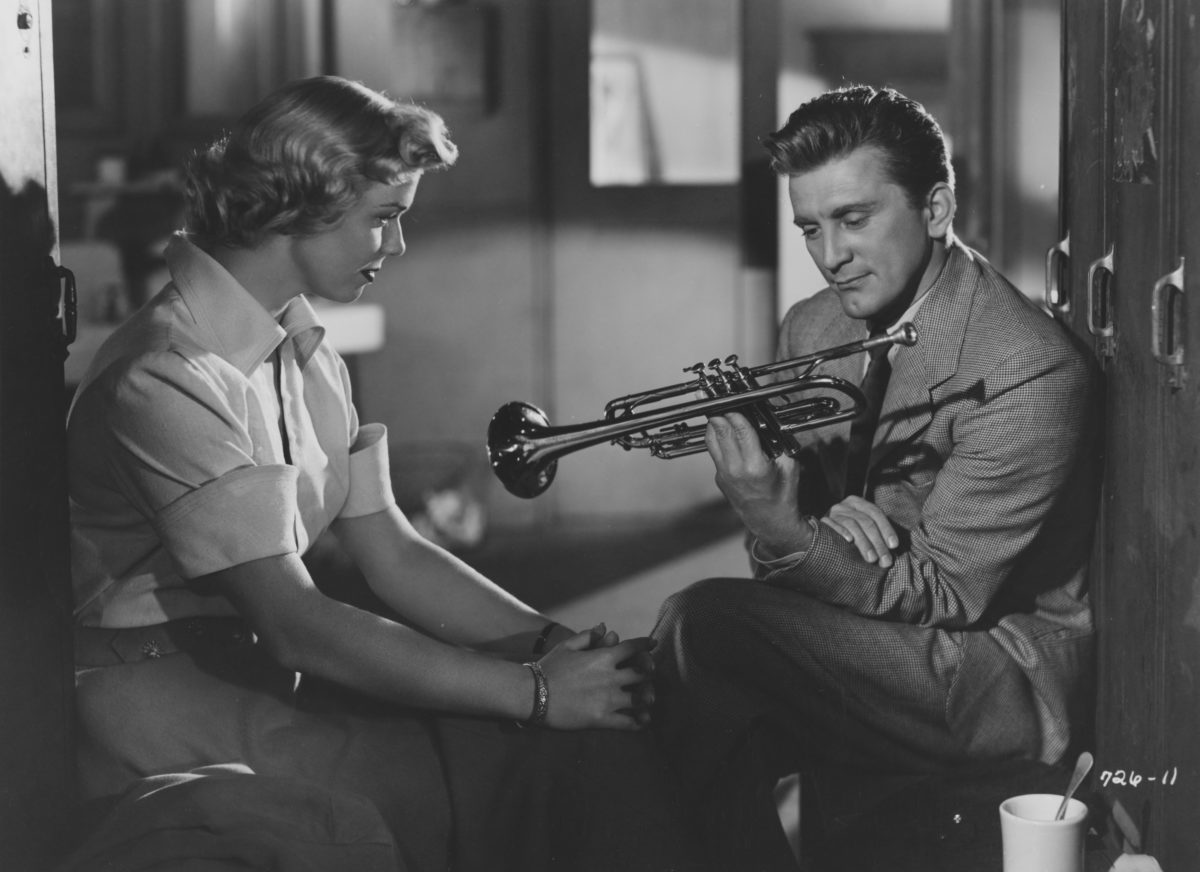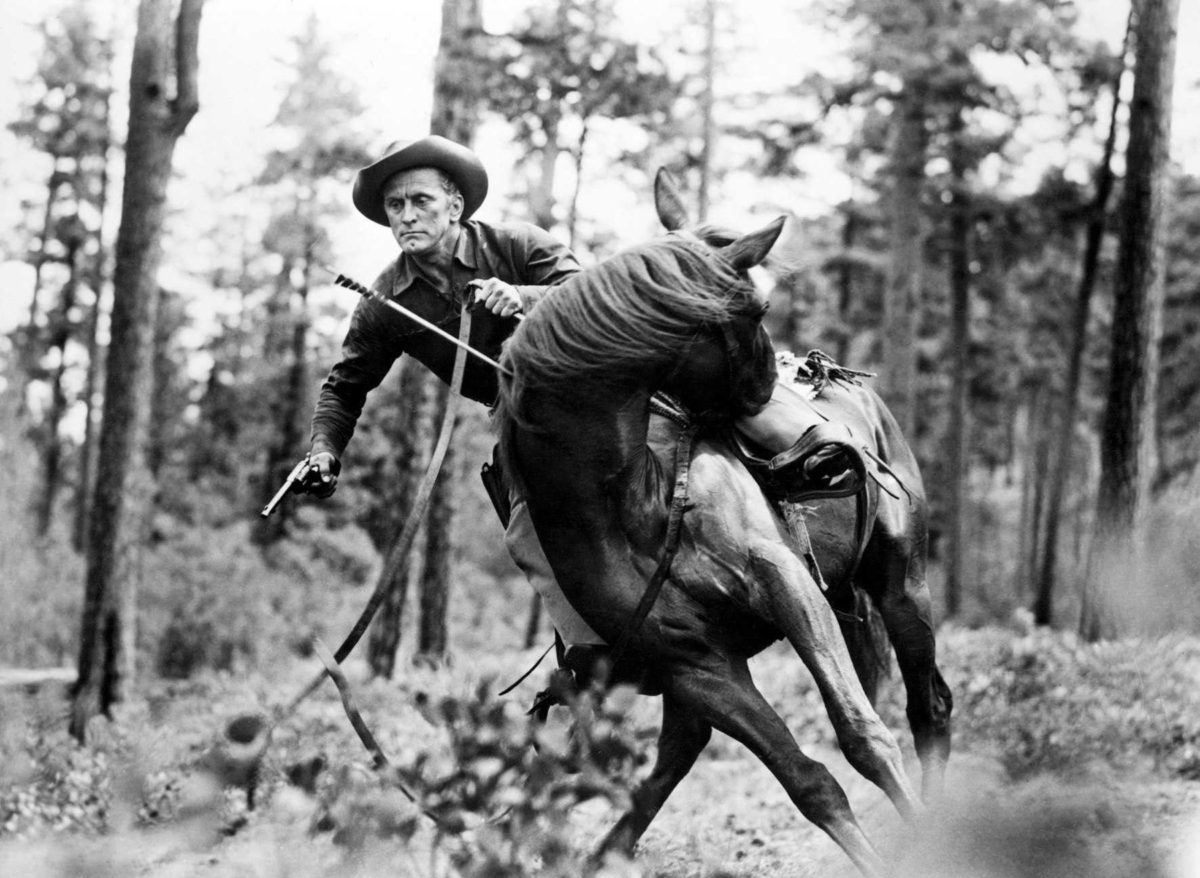Picture a sandy beach with furious waves breaking on the shore. Kirk Douglas has been playing a game of chess with Death for the longest of times. Death almost gave up. After all, how much longer was this guy going to fend him off? But then—finally! —Kirk cracked a smile and decided Death deserved a break.
Kirk Douglas, the Hollywood film star of a long bygone era, has died the 5th of February 2020.
Kirk Douglas was born in 1916 as Issur Danielovitch Demsky, the son of poor Jewish-Russian immigrants. His father was a ragman and his mother could not read or write in English and raised the large Demsky family—Kirk had six sisters—mostly by herself when father Demsky was out and about again. In his childhood and youth, Kirk was confronted with poverty and institutionalized anti-Semitism, but he was an optimist by nature and never a quitter (his age being the most potent proof of this statement), and he took on the obstacles in his path with undeterred determination. He got himself through college, trained to become an actor, and made it big in Hollywood as an actor and producer. Today, the Douglas name stands for the best of classical Hollywood, for earned and respected star power, and for an indisputable professional legacy that includes the work done by his son Michael as both actor and producer.
Douglas was blessed with good looks, but his beauty was neither like the Greek-God brawniness of a Burt Lancaster nor like the blue-eyed symmetry of a Paul Newman. He was blond with blue eyes, his nose was, well, noticeable and he had that dimple. Personally, what I liked about Kirk the most was not the dimple—if you want to know how you shave “in there” just watch Strangers When we Meet (Richard Quine, 1960) where Douglas explains how such things are done—but the smile. It was a smile “like ice breaking” according to one poetic critic, and it was always accompanied by a twinkle in his eye. Sure, Douglas was a bad boy at heart, his eyes seemed to tell us, but hey, at least he had a heart.
Kirk entered movies in 1946 alongside Barbara Stanwyck and Van Heflin in the intense, alcohol-drenched, The Strange Love of Martha Ivers (Vincente Minelli). Douglas played second fiddle and his character is something of a weakling as is the fate of most men paired with Stanwyck. Yet his screen presence was convincing from the start and not threatened by the likes of Heflin. Douglas loved to tell the story that in all his excitement of finally getting his big break he had mistakenly memorized Heflin’s part, the part of the lover, instead of the part of the wronged husband. When he realized his mistake during rehearsals Heflin was perturbed but Stanwyck simply laughed. Douglas lived through the embarrassment and after this hiccup proceeded to be quite outstanding in the clever and stylish noir Out of the Past (Jacques Tourneur, 1947). Obviously he could not out-cool Robert Mitchum, who was the film’s undisputed star, but Douglas’ passive aggressive character (“Whit Sterling”) is simply impossible to forget. At one point he says: “My feelings? About ten years ago, I hid them somewhere and haven’t been able to find them.” And you believe him.

Douglas’ breakthrough role was as the vain and though boxer, Midge Kelly, in Champion (Mark Robson, 1949). It is a delightful sports movie/fictional biopic that dared to make its principal character a son-of-a-bitch without wasting too much time on explaining why the man had turned out the way he did. The film sees Douglas’ character cheating on his wife, then on his girlfriend, double-crossing his brother and all of his friends until he finally meets a sad end (he dies of cerebral hemorrhage after a fight). This is the kind of required poetic justice that gave Douglas the leeway of being such a pain in the first place but it also signaled that he was still a star on the make, otherwise the star dying in the end would not have been the preferred narrative closure. Douglas himself joked at the time that the only reason he finally got noticed in Champion was because it was the first time he took off his shirt. In the forties and fifties, male nudity (chest-baring) was generally reserved for selected genres or specific narrative contexts that made this probable: sports movies, peplum films, short bathroom scenes (and off-screen for the occasional beefcake holiday picture). Baring his chest as a professional boxer in Champion was narratively warranted but Douglas realized there and then that taking off his shirt was a bonus and that it upped his popularity (a wisdom Matthew McConaughey might have taken directly from Douglas). Burt Lancaster, Douglas’ friendly rival, came to the same conclusion. Douglas beefed up and frequently showed off more flesh, quite notably in The Vikings (Richard Fleischer, 1958) and of course in Spartacus (Stanley Kubrick, 1960). In The Big Sky (Howard Hawks, 1952), a pioneer western about Missouri furriers, he keeps his shirt stubbornly open the whole movie despite the fact that his character is badly wounded and that it is repeatedly stated that he is really very COLD. (Then button up, man!) Douglas was still bravely and perhaps also unnecessarily doing his scenes bare-chested in Saturn 3 (1980).
In most of his early roles—Champion, Out of the Past, Ace in the Hole—Douglas invariably oozed charm but he also exhibited a delicious kind of loathsomeness, a combination that would become his trademark. People love charming scoundrels, I know I do, and Douglas played his share. In I Walk Alone, his first pairing with Burt Lancaster, Douglas plays Noll ‘Dink’ Turner, a man who double-crosses the friend who went to jail for him. Lancaster would mostly play the good (or better) character next to Douglas’ nastier or grubbier characters (usually ending up biting the dust however). In John Frankenheimer’s stylish and smart Seven Days in May (1964), both actors reversed this natural order. Lancaster is the power-mad general planning a coup; Douglas is the voice of Democracy and American righteousness. Douglas has said of Lancaster: “We argued, we fought, we talked, we made up.” Their life-long rivalry disguised as friendship (or the other way around) is one of those persistent and mythologized Hollywood stories. As the story goes, Kirk Douglas wanted to be Lancaster, he wanted his looks, he wanted his women, he wanted his parts. True or not, they made six pictures together and they jovially sang a song during the 1958 Oscars, which they both attended despite not being nominated. “What’s up next,” asks Douglas. “Best actor,” Lancaster replies. When they ‘realize’ they are not nominated they congratulate one another and start singing “It’s Great not to be Nominated.” Douglas was nominated three times: for Champion, The Bad and the Beautiful and Lust for Life, but never won, although he did receive a lifetime achievement award in 1996. (Lancaster was awarded an Oscar for Best Actor for Elmer Gantry in 1961.)
Another one of Douglas’ attractive assholes was Chuck Tatum in Ace in the Hole (Billy Wilder, 1951). Here Douglas plays a newspaperman who claims that if there is no news he is willing to go out there himself to find a dog to bite. In The Bad and the Beautiful (Vincente Minnelli, 1952), one of several films about Hollywood that were made in the early fifties, Douglas plays a movie producer, a character infamously based on David O. Selznick, the independent producer of Gone With the Wind, Rebecca, Spellbound, Duel in the Sun… who had a reputation for being a controlling and sometimes ruthless workaholic. It was a perfect fit for Douglas. The film’s structure echoes Citizen Kane as it is told in flashback form and covers the perspective of three different people. None of this should surprise us as the film’s producer, John Houseman, had been involved in both Citizen Kane (script supervisor) and had worked for Selznick. In the film Douglas’ character has screwed over everybody but he remains irresistible and they all willingly succumb to his charms. Kirk Douglas would make another picture about the movies with Minelli in 1962, the Runaway Hollywood yarn Two Weeks in Another Town. Douglas plays a Hollywood has-been actor trying to rekindle his career, or at least trying to make a buck or two to pay for his alcohol addiction in a trashy Italian movie. Kirk’s character finds unsuspected success and love in this overseas adventure. (It should be clear from this example that Quentin Tarantino had scripts—real life and otherwise—aplenty to furnish his own Once Upon A Time in Hollywood.)

Moral outrage and plain decency were part of his repertoire as well. Douglas played a series of unquestionably good guys in two self-produced films, most notably Spartacus and Paths of Glory (Stanley Kubrick, 1957), in the latter defending three soldiers court-martialed for cowardice. Paths of Glory was, according to Douglas, “a worthwhile class picture” for both himself and United Artists, but the picture did not make any serious profits. The Heroes of Telemark (Anthony Mann, 1965) is an old style hero adventure movie. The movie lacks moral complexity and narrative panache—the Nazi’s are the bad guys, Kirk and his gang are the good guys, and the good guys win in the end—but it is simple and satisfying (and includes awesome skiing scenes). In The Big Sky, Douglas performs brilliantly during a vintage Hawks moment: he sings a wistful song in a barroom (‘Whiskey, Leave me Alone’). It’s not as satisfying as ‘Peanuts!’ in Only Angels have Wings or as swinging as ‘Drum Boogie’ in Ball of Fire, but the pleasure is palpable, and the musical intermezzo consolidates the camaraderie between the main characters. Still it would appear that Douglas was never 100 percent comfortable in the role of Hero (and therefore to me Spartacus is not his best performance). When he was making Lonely Are the Brave (Spartacus had not yet been released then) a modern, realist, sort-of-leaning-to-the-left western, he wrote a letter to Gary Cooper (who was very ill at the time). In this letter Douglas confessed that the film’s then working title, ‘The Last Hero’ seemed an odd fit for him. His director, David Miller, wanted him to play “like Cooper” and according to Douglas the author of the book the film was based on looked like Cooper, so maybe it should be Cooper starring as the film’s hero? Even though this story is probably apocryphal, it still illustrates how much Douglas was aware that he was no Cooper, who had always fit the part of the sturdy, silent and righteous cowboy hero like a glove.
Like other newish stars who had risen to fame after the Second World War (Burt Lancaster for one) he founded his own production company in 1955. He named it Bryna, after his mother. Douglas took producing seriously, and he went after projects that satisfied his appetite for spectacle as well as his desire to make films that mattered. He was also unafraid (even actively looking for) projects that were more off-beat to the extent that United Artists warned him to “stick to safe ventures.” Some movies were made for the heart, others for the bank, some of them managed to please both. He produced some great pictures along the way, and at least half a dozen very good ones, The Indian Fighter, Paths of Glory, Seven Days in May among them.
What he will always be remembered for (and what he liked to remind people of) was that he was the first to break the infamous blacklist by giving Dalton Trumbo his screenwriter credit for Stanley Kubrick’s Spartacus in 1960. Trumbo had been blacklisted by the industry after his conviction for contempt of court (he had refused to answer questions of the House Un-American Activities Committee) when subpoenaed in 1947. Trumbo had kept on working in Hollywood albeit under false names or under the cover of other writers’ names. (He had even won an Oscar in 1956 for The Brave One under a false name.) After more than ten years of hypocrisy and moral and political unrest in Hollywood, Douglas finally broke the blacklist with Spartacus. Douglas actually mostly beat Otto Preminger to the chase as Preminger was planning on crediting Trumbo as the screenwriter of Exodus in the same year, but Spartacus was released before Preminger’s film. At any rate: Douglas did take a risk, he did make a stand, and he deserves credit and our admiration for his act. In the preface to Douglas’ book on the making of the film George Clooney compared the actor-producer to Atticus Finch (the hero-lawyer of To Kill a Mockingbird). According to Clooney, Douglas was not the kind of man drawn towards moral crusading per se, but a man who knew when the fight found him what to do and what was the right thing to do. Perhaps of equal importance (but the story isn’t as immediately heroic as was the crediting of Trumbo) is the fact that Douglas pointedly remained friendly with those who were blacklisted and who often found themselves completely ostracized in and outside Hollywood. For example, Carl Foreman, the screenwriter of High Noon, also blacklisted, was never crossed off of Douglas’ Christmas card list. Foreman had written Douglas’ big breakthrough, Champion, and the film that had further consolidated that success, Young Man With a Horn (Michael Curtiz, 1950), costarring Douglas’ former sweetheart Lauren Bacall. Foreman went hiding in London and, to his surprise, found Douglas still willing to meet him there. Perhaps as a Jew, Douglas knew what it was like to be excluded, but this was more than a small act of kindness: Douglas was taking risks.

In 2014 he published Life Could Be Verse, part poetry book, autobiography, scrapbook and love letter to his second wife, Anne. One of his poems compares actors to Peter Pan-like creatures, but he warns that true happiness is not to be found in fame or fortune but only comes with self-knowledge and self-acceptance.
Actors Are Children
Actors are children,
Who refuse to grow up.
They live in a land of make-believe.
They play sailors, soldiers, and cowboys too.
They’re happy when they deceive.
Hard work can get you fame and fortune,
And maybe make you a star.
But nothing will make you happy
Until you know who you are.
I have a sense that Kirk knew who and what he was. Hedda Hopper thought she knew too: she described Douglas in 1950 as dynamic, virile, and canny. Now did he live up to that gossip columnist’s prediction.
Checkmate.
